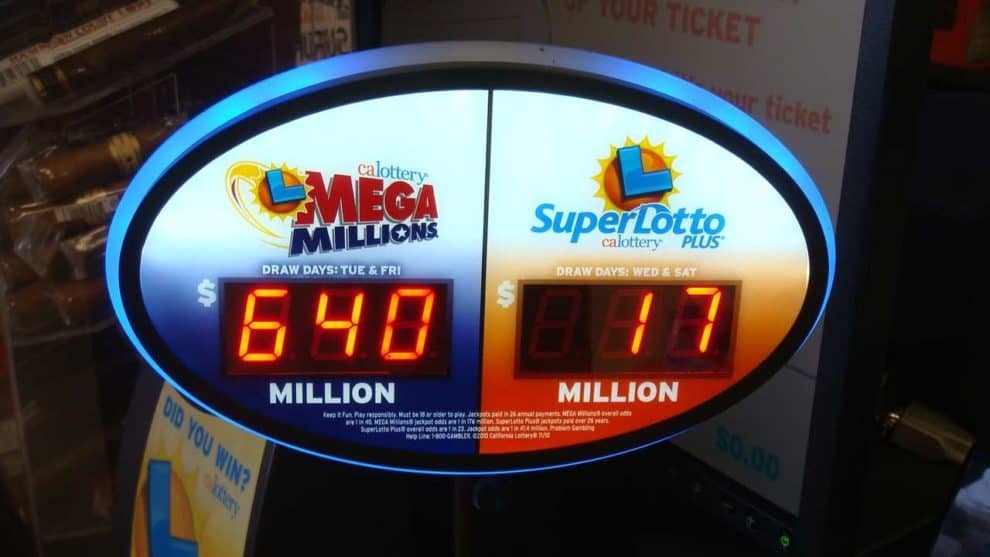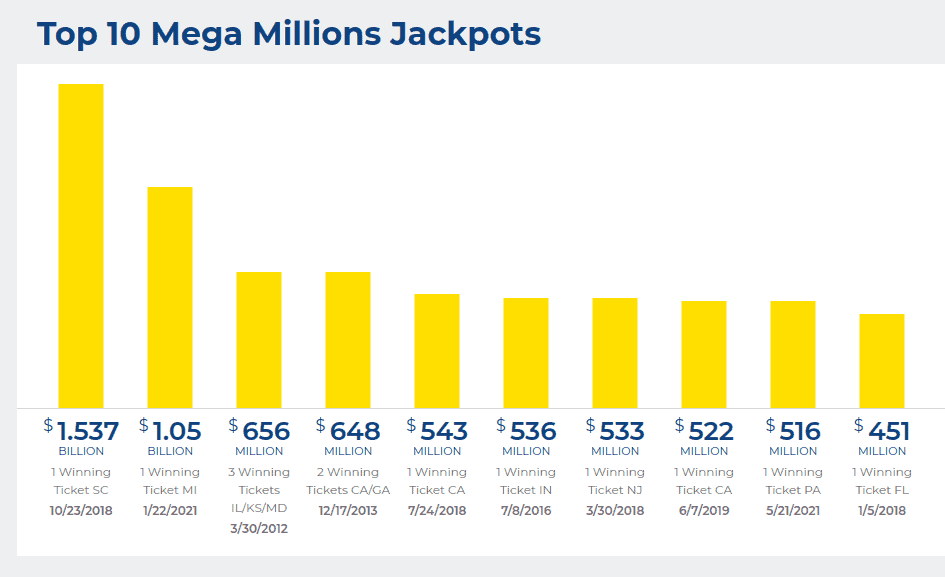
- The nationwide Mega Millions Lottery Jackpot is up to $830 million USD ahead of Tuesday’s drawing.
- Mega Millions games are available in 45 US states plus the District of Columbia and the U.S. Virgin Islands.
- The odds of winning the Mega Millions Jackpot are just over 1 in 302.5 million
Tuesday night’s Mega Millions drawing will be the third largest in history for the networked lottery game. The total is up to $830 million USD due to the usual surge in interest among mathematically challenged Americans. The Mega Millions drawing will take place Tuesday, July 26 at 11 PM Eastern.

If you want to read our previous coverage of the current Mega Millions jackpot you can do so at these links:
THE ASTRONOMICAL ODDS AGAINST WINNING THE MEGA MILLIONS LOTTERY JACKPOT
MEGA MILLIONS LOTTERY JACKPOT ODDS IN CONTEXT
WILL THERE BE A WINNER IN TUESDAY’S MEGA MILLIONS JACKPOT DRAWING?
Obviously, every state and local media outlet is running the standard fare of breathlessly excited puff pieces about this jackpot in particular and the lottery in general. Journalistic laziness abounds–one frequent misstep is reporting that Tuesday’s jackpot is the ‘third largest in US history’. Nope–it’s the third largest *Mega Millions* branded jackpot ever. Now that the haul is up to $830 million USD it’s more than all but two Mega Millions jackpots and just one Powerball jackpot ($1.58 billion in 2016). The largest non Powerball/Mega Millions jackpot came in 2000 when ‘The Big Game’ networked lottery paid out $363 million USD. This is admittedly a technicality as ‘The Big Game’ was rebranded to ‘The Big Game Mega Millions’ before transitioning to the current ‘Mega Millions’ name in 2002.
The largest non-Powerball/non-Mega Millions/non-Big Game lottery jackpots were $118.8 million USD (California Lottery, 1991), $115.6 million USD (Pennsylvania Lottery 1989) and $106.5 million USD (Florida Lottery 1990). The largest slot machine jackpot in history came in 2003, when a player won $39.7 million USD on a Megabucks slot machine at the Excalibur in Las Vegas. An article on the slots jackpots gives this downright laughable piece of ‘advice’:
As you can see from our list, it’s possible to get rich by playing slot machines. However, if you want to make big money, you will need lots of luck. Unfortunately, we don’t know the details of how the above-mentioned players managed to win the jackpot. However, if they could make it, you can do it too.
A lottery website offers this insane guidance:
If you wish to sign your name into the lottery history, then the best way to do so is by winning fairly. It is true that, at first glance, the chance to win the lottery may seem slim to none, but the numbers state something else.
Uh…no they don’t. If anything, people just don’t pay attention to what probabilities like 1 in 302.5 million actually mean. The same website has some strategy tips for would be lottery winners:
It is good to buy tickets regularly or get a multi-draw ticket if you play with the same numbers every time. Another option is to buy more than one ticket for each draw. This may dig in your pocket, but it could also bring a larger prize in the end. The last option is to join a syndicate because the lottery draw history shows that 20% of all lottery jackpots are won by groups or syndicates.
Pick the lotto numbers wisely. Here, there are no strict rules, but most serious lotto players have reached to the conclusion that you should avoid picking consecutive numbers. Some numbers are luckier than others. This is due to cultural or personal superstitious beliefs, but also to the observation that some numbers are drawn more frequently than others.
That advice is so dumb it makes my head hurt. To summarize:
- Buy a lot of lottery tickets, even if it causes short term financial distress.
- Some numbers are luckier than others.
- Some numbers are drawn more frequently than others.
The third point should actually say something like “some numbers *have* been drawn more frequently than others”. Assuming this is true, it’s completely due to a small sample size. Read up on the ‘Law of Large Numbers’.
State lotteries prey on this type of mathematical ignorance by compiling lists of the ‘luckiest stores’ in their jurisdiction. The media then reports the same nonsense with a straight face. Or they do it one better, reporting on the ‘luckiest states’ for lottery jackpots. Another media outlet in Pennsylvania offers this pointless qualifier:
The odds of winning the Mega Millions jackpot prize is roughly 1 in 302,575,350, lottery officials said. But a player’s overall chance of winning any prize is 1 in 24.
There’s also this sobering bit of news:
Lottery officials on Tuesday told FOX 29’s Chris O’Connell that as of 4 p.m., more than 6,300 tickets were being sold per minute in Pennsylvania. Even with a slim-to-none chance of winning the Mega Millions, everyone has a plan if the dream came true.
“I would pay off my bills, I guess I would buy a new house, I would donate some money and all my family would get part of it,” a lottery hopeful told FOX 29.
They wasted a couple of paragraphs to give an example of how a lottery player would spend a jackpot, presumably not realizing that the majority of ersatz winners would say the exact same thing.
In a previous article, we shared the only legitimate ‘strategy tip’ that I’m aware of for playing the lottery:
There’s no more vivid illustration of why so few people are able to make money gambling than the lottery. The math behind the lottery is simple. A fairly bright high school student could explain the long odds and point out the mistakes people make playing the lottery such as buying hundreds, if not thousands, of dollars worth of tickets hoping to win a jackpot. One of the more bizarre byproducts of the nonstop media hype surrounding the lottery is the appearance of ‘experts’ offering ‘lottery tips’ for ersatz jackpot winners. More often than not, these are former jackpot winners who by virtue of their good fortune are now treated like experts on math and probability. I have heard one–and only one–good piece of advice for playing these big money Mega Millions jackpots: use the computer generated ‘Quick Draw’ to pick your Mega Millions numbers. The logic here is sound since computers are better than humans at selecting truly ‘random numbers’.
Every other tip, ‘strategy’ and/or conventional wisdom you’ll hear from lottery players is wrong. Buying a whole bunch of tickets for a big jackpot is the classic one. You might increase your chances of winning but by so little that it doesn’t really matter. You have almost zero chance to win a Mega Millions jackpot. Buying another ticket doesn’t ‘double your chances’ since the product of multiplying ‘almost zero’ and ‘almost zero’ is still ‘almost zero’. Using the same set of numbers over and over again also doesn’t matter, nor does using your kid’s birthday or any other ‘lucky number’. A random number generator doesn’t care about any of that.
Even though the lottery is a massive ‘sucker bet’, if you want to play it that’s your business. I do wish that the media would quit reporting on lottery jackpots with so much enthusiasm. Some context–about the demographics of lottery players, the math behind the probability and the gambling addictions the lottery facilitates–would be nice. There’s a tendency of focus on the downsides of every other form of gambling but for some reason the lottery gets a pass.









